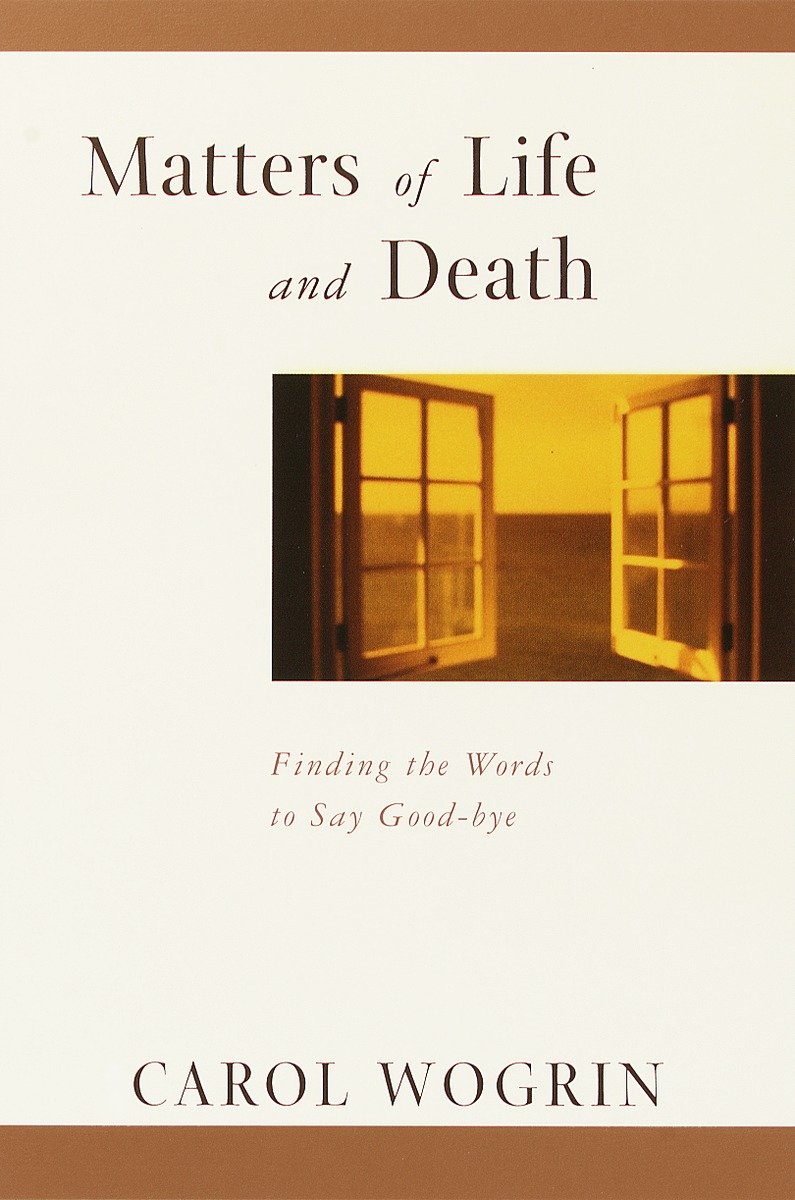Matters of Life and Death: Finding the Words to Say Goodbye
| by |
|---|
12.00 JOD
Please allow 2 – 5 weeks for delivery of this item
Description
Plenty of books explore the emotions of coping with grief and a loved one’s death. But as psychologist Carol Wogrin has observed, there is little advice for those at a loss for words witnessing the process of dying. Matters of Life and Death discusses the importance of communicating with the terminally ill both through talking and nonverbal expression and offers suggestions for what to say to offer comfort, both emotional and physical. Brimming with constructive advice for opening up, Matters of Life and Death helps allay the fears that often silence friends and relatives in the face of death. Helping readers manage their fears–the fear of saying the wrong thing, of upsetting others, of facing overwhelming feelings–this book is a beautiful prescription for conveying a heartfelt message when it matters the most.
Additional information
| Weight | 0.26 kg |
|---|---|
| Dimensions | 1.35 × 13.97 × 21.59 cm |
| PubliCanadation City/Country | USA |
| by | |
| Format | Paperback |
| Language | |
| Pages | 208 |
| Publisher | |
| Year Published | 2001-8-14 |
| Imprint | |
| ISBN 10 | 0767903951 |
“Carol Wogrin’s dual training as a nurse and developmental psychologist has informed this thoughtful and pragmatic guide rare in its intellectual depth, yet concise and clear in its how-to approach…It will be of use to clinicians working with family members of persons nearing the end of life and to those family members themselves.” |
|
| Excerpt From Book | OneTalking with Dying People: What Do You Say, What Do You Do?The most essential thing in life is to develop an unafraid, heartfelt communication with others, and it is never more important than with a dying person. –SOGYAL RINPOCHEDeath is a guaranteed part of all our lives–the deaths of people we love, as well as our own death. The question is not whether we face death or not, but rather, how we face it. Despite the fact that death is an inevitable experience for everyone, many of us still, when confronted with an impending death, unconsciously react with avoidance to our strong feelings of fear and sadness. Few of us have learned to develop a facility for talking about death, or talking with dying people.The Value of Saying GoodbyeGrieving begins as soon as you get the news about a serious illness or the impending death of someone you love, and continues long after their death. The art of saying goodbye really begins at this time of first knowing the person you love will be leaving your world.Our relationships with people who are dying are different, and do have a special poignancy that others don't. You may have only a week to say goodbye, or you may have years, but it is your acute awareness that their life is now time-limited, and your relationship with them also time-limited, that gives you both the opportunity to interact differently.One of the most important tasks in moving through the grief process is shifting from interacting with the dying person in your external world, to holding them entirely in your internal world–in your thoughts, memories, and feelings, and in your very identity. Saying goodbye, in words and actions, helps clarify your feelings about what a particular relationship has meant to you, and lays the groundwork for the process of making this shift. When you take the time, and make the effort to say a conscious goodbye, you will know the person you love better, and you will know yourself better.Why Is It Important to Say Goodbye,In Words or Actions?When hit with a loss as large as a death, you inevitably are left with many difficult feelings–sadness, anger, regret, sometimes depression. The grief process, which involves making sense of these feelings, coping with them, and reworking them, always takes a lot of time. The specific feelings you have, and the intensity of the different feelings, will be partially determined by the way you use the time you have when the person you care about is dying. Saying goodbye, in words or in actions, can give you the opportunity to share your love for another clearly and deliberately.Generally, when you are careful and conscious in what you say and do in the final years, months, and days of a person's life, you will have fewer regrets after they die; you won't be agonizing over what you should or could have said in the past. A thoughtful goodbye can also give you the opportunity to resolve old conflicts that have long gone unaddressed, and leave the relationship feeling more complete.Relationships are built on experiences shared between two people. It is only logical that you need an ending to a relationship that takes place between yourself and another person. When you don't take the opportunity to say goodbye, you will likely be left with the challenge of working through a relational process entirely on your own. This is a much more difficult task.Being able to join and support a person in their final phase of life, and talk with them about what their life has been, who they have been to you, and how they will remain with you is of vital importance in working through this process. This joining and sharing will take different forms in different relationships, depending on the personalities involved.Many of your thoughts and feelings after a death–whether or not you feel regret at things left unsaid or unexpressed–have to do with aspects of your own behavior that involved a choice for you. Usually, after someone close to you dies, you think about who you were in the relationship, what you did or didn't do, say, give, or what you did and didn't share while you had the chance.You may be so used to avoiding awkward or highly charged emotional situations that you find yourself completely overwhelmed by strong feelings when you learn someone you love is going to die. This is normal. But if you respond to those feelings by withdrawing or freezing up emotionally, you will not be able to talk to the dying person. You may miss the last opportunity of a lifetime.The Power of SecretsHonesty is an important aspect of relationships, and certainly necessary if we want to be close to someone. This is especially true when we are dealing with times as significant as the impending end of someone's life–the final opportunity to be close to him. However, all too often during this emotionally difficult time, the importance of honesty seems to be forgotten, and people act instead on their desire to "protect" loved ones from emotional pain. Rarely does this approach actually help the person. Usually, they are left more isolated and alone.Mr. JohnsonYears ago, I had an experience that impressed upon me the extent to which well-intended secrets can cause pain at the end of life. During college, I worked the night shift in a community hospital as a nurse's aide. In this role I was usually assigned to the jobs that the unit nurses least wanted to do.On this particular night, Mr. Johnson was dying. Mr. Johnson had, reportedly, always been a very proud and private man. He was quite elderly, was bleeding from his intestines, and due to complex medical problems, little could be done to stop it. The previous afternoon, his daughters, with the encouragement of his doctor, had made the decision to withhold this information from him. They believed they could shield him from unnecessary distress by withholding the information that he was dying. The doctor said his death would be fairly rapid, so it seemed kind to spare him this devastating news.His daughters left at the end of visiting hours, as they were required to do in those days. With "cheerful" assurances, they told him they would see him tomorrow. When I came on duty near midnight, I was apprised of the situation and assigned to spend the night at his bedside. I was given very specific instructions on what not to say. He was not to be told that he was dying. Worse still, he was not told that he was bleeding, since he was, of course, bright enough to understand the consequence of uncontrolled bleeding.All night long, Mr. Johnson was on and off the bedpan, thinking his bowels were very loose. During the first half of the night, he got increasingly angry at the fact that no one would give him anything to treat his condition. I stood mute as he yelled at me. The nurses, who were all uncomfortable with the situation, avoided the room like the plague. As the night progressed and he got weaker, he could not always make it to the bedpan. His anger turned to shame. Had he known he was bleeding, the situation would have been much more tolerable. Adults don't feel shame when they can't control bleeding. They do feel ashamed when they can't control their bowels. He became quieter, more apologetic, and more withdrawn each time I cleaned him up. I could offer no true support, because I was little other than a witness to his loss of control. At eight o'clock in the morning, after an active and productive life, Mr. Johnson died, ashamed and alone.Even at the time, I understood what a tragedy this was. Mr. Johnson was a competent man. He had led a life with much to be proud of. He had daughters who loved and respected him. Out of love, their own fears of death, and feelings of helplessness, they followed advice that they believed would make his final hours easier. The result was cruelly opposite. This independent man was stripped of all choice about how he would say goodbye. His distorted view of the situation caused him to spend his final hours feeling badly about himself. His daughters, also, had no opportunity to say goodbye to their father. The last interactions his daughters were able to have with him were those of pretense.Secrets are very meaningful. They influence how close, or not close, you feel. They determine who's in and who's out. Think of the effect secrets have, even when they are in the service of something good or fun. When planning for a surprise party, for example, there is a time when those doing the planning exclude the person who the party is for. The person the party is for may have a sense something is going on, but doesn't know what. This is all fine, of course, because it is minor, done with good intent, and with an end point to the exclusion. When the party happens, the recipient will, hopefully, enjoy the result.But, as in Mr. Johnson's case, when you keep secrets about an illness, they have many of the same consequences, only without the happy ending. The person who is excluded probably has a sense that something is going on, but doesn't know what. Or he may have a good idea of what is going on and get the message that no one is willing to talk with him about it.People may decide to keep information about a very poor prognosis from an ill parent or spouse, believing that they are being kind by sparing them the pain of knowing. Unfortunately, though, that person is now excluded. The people who know will be putting their energy into pretending. Their actions and emotions will be different than what they are saying. While they try to pretend that things are fine, their emotions will show in some way, whether it's through tension, sadness, a false cheerfulness, or avoidance.Usually, the dying person knows they are dying, even when not told, and they get the message loud and clear that it is not to be spoken about. As a result, a wall is created between people at the very time that closeness is most needed.What Is a "Good Death"?Not all people need the same thing or achieve their needs in the same way. Some people like to talk about everything in great detail. The more they share verbally, the closer the bond. Discussions about events, impressions, thoughts, and feelings are central to interactions. For others, talking about feelings and intimate details of life feels very uncomfortable or unnecessary, and it is the sharing of experiences, pursuing common goals, or participating in events together that is the foundation for caring relationships. Still others define their relationships by the degree that they know that someone will be there in times of need–the person who knows you well enough to anticipate what you need and provide it when necessary.This range of personality styles is equally seen in the ways that people approach death. From the popular writings of Elisabeth KYbler-Ross in the 1970s the idea of a "good death" emerged. Unfortunately, in our desire to figure out a "right" way of dealing with death, we ended up defining the idea of a "good death" very narrowly. The "good death" is often thought to be one in which family members gather together and talk about the impending death–fears, feelings, and plans. Family members talk about things that have gone unsaid for many years; everyone's feelings are understood, and long-standing conflicts are resolved. All who are closely involved have worked through their feelings of anticipatory grief to the point of peaceful acceptance.This scenario of openness about the death, and about all the complicated feelings that go along with it does happen sometimes, though in my experience, not very often. It certainly is a "good death." However, it is not the only type of death that is "good." There are many ways to come together in final days, to support the person who is dying, to reflect on his or her life and the relationship, and to share what needs to be shared. You can accomplish your goal of being supportive and saying your goodbyes in many different ways–probably as many different ways as there are relationships.People die the way they live. We do not usually change drastically when we are facing a crisis or major life event. If someone is demanding, bossy, or cranky throughout their life, they are probably going to die demanding, bossy, and cranky. There is the occasional dying person who opens up in a way they never have, and, in a dramatic way, is able to patch up problematic relationships or build relationships where there was previously little emotional connection. This, however, is rare. For most people, the growth that takes place in the final stage of life is simply the next step in their lives, and not a giant leap to becoming someone very different than they were.Likewise, we should not expect ourselves to change drastically to meet some preconceived idea of the way we "should be" when a friend or family member is dying. If you have always been very private about your emotions, you are probably not going to pour out your innermost feelings because of an impending death. If you have always been very expressive and emotive, you are, most likely, not going to suddenly become very quiet, calm, or stoic in the final time you have to share with someone. If a family's way of engaging with each other has been through arguing and struggling, this is probably the style that will continue.You are who you are. Part of who we all are, however, is someone who can grow. You can stop and look at the ways you hold yourself back, and find new ways of communicating, either in words or in actions.To say goodbye find ways to negotiate not only your own feelings, but also the different personality styles in your relationships. It is often easier to accomplish this task among your close friends, who tend to be like you in many ways–either in personality or values. They are people with whom you have chosen to be connected.Negotiating the task with people from the family you grew up in–parents, siblings, close grandparents, aunts, or uncles, however, may be much more difficult. You don't choose your family members and you may be very different from them in personality, values, and life view. Everyone in a family has their role, based on position in the family and individual personality. Commonly, different people in the family carry out different aspects of the family system, with different people being more or less emotional, logical, responsible, fun-loving, impulsive, conservative. Siblings in a family may run the gamut from the "successful one" to the "black sheep." |
Only logged in customers who have purchased this product may leave a review.
Related products
-
On backorder 2-5 Weeks to Arrive
15.99 JOD -
On backorder 2-5 Weeks to Arrive
15.99 JOD -
On backorder 2-5 Weeks to Arrive
13.00 JOD -
On backorder 2-5 Weeks to Arrive
15.99 JOD






Reviews
There are no reviews yet.